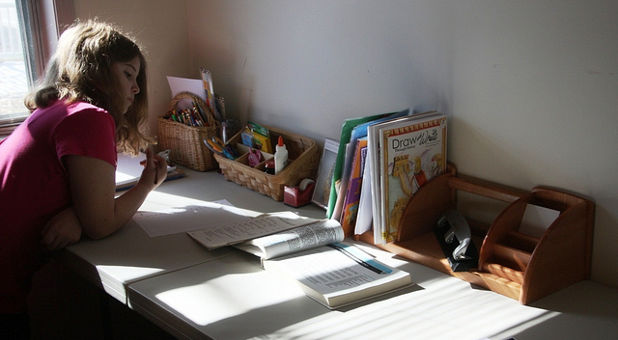When Jennifer Pedersen-Giles started to home-school her son Westen six years ago, it was because he needed a more hands-on environment than what public schools could offer. Now the eighth-grader studies writing, music, art, geometry, literature and world religions from his home in Arizona.
Religion, in other words, had nothing to do with his mother’s decision.
She’s not alone. According to the federally funded National Center for Education Statistics, the share of parents who cited “religious or moral instruction” as their primary motivation for home schooling has dropped from 36 percent in 2007 to just 16 percent during the 2011-12 school year.
“You used to have to be a hero to home-school,” said John Edelson, founder and president of Time4Learning, a curriculum provider for home-schoolers. “You were really going against the mainstream. Your mother-in-law didn’t understand it, the neighbors didn’t understand it, police would stop you in the middle of the day and wonder what was going on.”
As home schooling slowly becomes more mainstream—3 percent of American students age 5-17 are home-schooled, up from 2.2 percent in 2003—most parents cited the environment of public schools (25 percent), not religious belief, as the main reason behind their decision to home-school.
Edelson said the number of home-school families who do so for religious reasons has not decreased, but the percentage of those who list it as a first priority has dropped as other parents join the home schooling community for different reasons.
“You go to any cocktail party, church, any group of people and you say, ‘I’m in the home-schooling business,’ and all these women will jump on it and say, ‘Oh, we home-schooled,’” Edelson said.
Brian Ray, president of the National Home Education Research Institute, a nonprofit organization that conducts original research, said years of studies on home education led to its increasing acceptance.
“In the earlier days of the modern home-school movement, because home schooling was such a tiny, tiny minority of the public, parents had to be very strongly committed to what they were doing,” Ray said.
Gretchen Buck, administrator of Global Village School, the customizable home-schooling program that Pedersen-Giles uses, said there is more demand for home schooling as public schools struggle. Many parents do not like the emphasis on standardized tests; others remove their children because of bullying.
Others, like Pedersen-Giles, realize their children struggle when asked to sit at a desk for extended periods.
“By third grade, school was more about production levels with the onus being on the child to adapt to the classroom environment,” she said. “(Westen’s) individual needs were not being met. It would have taken so little for things to be different, but after exhaustive pleas to teachers, I decided that I would have to create my own change.”
This rise in mainstream home schooling is reflected in curriculum needs, Buck said.
“A lot of people who contact us are looking for an alternative to the very many overtly Christian home-schooling programs that are out here, because that just does not fit in with their values,” Buck said. “They’re looking for secular home schooling or just generally nonreligious.”
In the case of Pedersen-Giles, her family does not adhere to a particular religion. She often discusses world religions with her son, and said he is free to choose his own beliefs.
Edelson said there are generally three types of home-schoolers: those who do so for religious reasons; the “free spirits” who oppose a regimented public school system; and the “accidental home-schoolers” who find their children do not thrive in a traditional school environment.
“Part of it is driven because they’re disappointed in the schools,” Edelson said. “If we had better schools, if the schools weren’t so confused and having trouble with testing and having trouble with budgets—that’s one of the things that’s fueling the home-school movement.”
Copyright 2013 Religion News Service. All rights reserved. No part of this transmission may be distributed or reproduced without written permission.








































